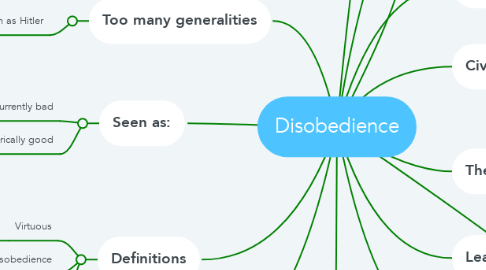
1. Definitions
1.1. Virtuous
1.1.1. Having or showing high moral standards
1.1.1.1. Leads to the question: What do we classify as morals?
1.2. Disobedience
1.2.1. The refusal to comply with certain laws
1.3. Social Progress
1.3.1. Increasing capacity of a society to meet the basic human needs of its citizens, establish the building blocks that allow citizens and communities to enhance or sustain the quality of their lives.
2. Seen as:
2.1. Currently bad
2.2. Historically good
3. Too many generalities
3.1. Such as Hitler
3.1.1. He was disobedient however, we don’t see him as virtuous
4. Some disobedience leads to a progression in society
4.1. Our founding fathers lead the American Revolution against the British Crown
4.1.1. Without the disobedience we would have stayed under the British Rule.
4.2. The women’s suffrage movement
4.2.1. When thousands of women marched through the streets, endured hunger strikes, and submitted to arrest and jail in order to gain the right to vote
4.3. When unsafe working conditions and starvation wages still existed in the 1900s, it was necessary for the workers to go on strike to bring to attention their situation.
4.3.1. Their strike lead to higher compensation for workers and the establishment of child labor laws.
5. Many philosophers (including Socrates) believed that there could be no moral justification for civil disobedience.
5.1. Socrates lived by the philosophy of moral consistency.
5.1.1. He would much rather give up his life than his principles. He believed that wrong should never be returned for wrong.
6. Opposers may say that we could not possibly know that the act of disobeying would be worth the price (The end may not justify the means)
6.1. An example could be the French Revolution.
6.1.1. In 1871 the people thought they could overthrow the republic. However, the resistance backfired. 20,000 people were killed in one week and no reform was made.
6.2. While it cannot always be determined what may happen in consequence of disobedience, it also cannot be proven what would happen as a result of doing nothing.
6.2.1. Either way an appeal to ignorance renders the argument invalid. And a chance must be taken where there is substantial evidence that enough positive reform will result from the act.
6.2.1.1. If used correctly, it follows that civil disobedience is not disrespect for one’s country, but rather an advocate of promoting the purest form of moral government and the greater good of society.
7. Needed for when the government exceeds its authority and there is no practical alternative.
7.1. History has shown that the government can easily become corrupt and step in the rights of its citizens.
7.1.1. At this time is becomes the citizens responsibility to keep them in check, and what they may or may not have control over.
7.1.2. Our government has established a 3 tiered system in which the government checks itself. However, it is the citizens’ responsibility to make sure those checking in one another are also being fair and moral.
8. Leads to progression
8.1. We are direct descendants of these choices
9. Has many connotations
9.1. Most see it as negative
9.2. Others see through it and see that it takes...
9.2.1. Commitment
9.2.2. In order to be virtuous there must be a situation that needs this type of action to maintain justice, morality, safety, and the overall good of society
9.2.2.1. Must preserve moral integrity, combat immorality, and prompt positive social reform.
9.2.3. Needs bravery
10. KKK Example...
10.1. Let’s say the KKK took over
10.1.1. A very select few who agree with their ideas would see them as virtuous for being disobedient.
10.1.2. Most of the population would see them as criminals completely lacking any virtue.
10.1.3. The Society that emerges from this take over will see them as virtuous
11. Not all disobedience is virtuous
11.1. If the KKK did take over it would hurt many people
11.2. Hitler killed many people
12. The law
12.1. Our Government system is made to function on a laid out set of moral standards.
12.1.1. I’m a Democracy, each individual is entitled to promote these moral standards by helping to maintain and establish laws.
12.1.2. This system would not work unless we can rely on both the citizens and the elected officials to posses a sense of integrity to these standards.
13. The need for social Progress
13.1. Civil disobedience can bring attention to a cause and promote change in a problem that may have otherwise been overlooked.
14. Civil disobedience is not always good.
14.1. If this were the case then obeying the law would never be required and society would enter an anarchy.
14.1.1. But there are times when our democracy is not enough to make proper changes.
14.1.1.1. Following this, civil disobedience can’t really be seen as disrespect to our system.
